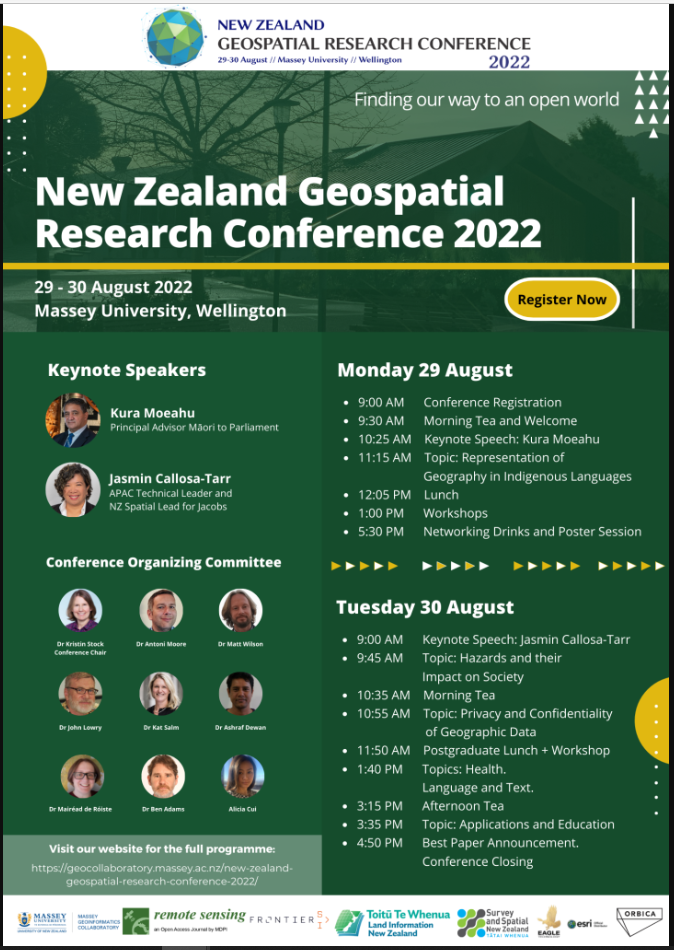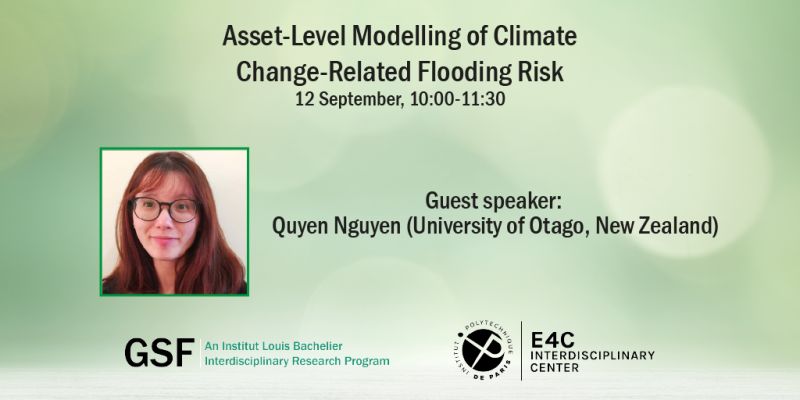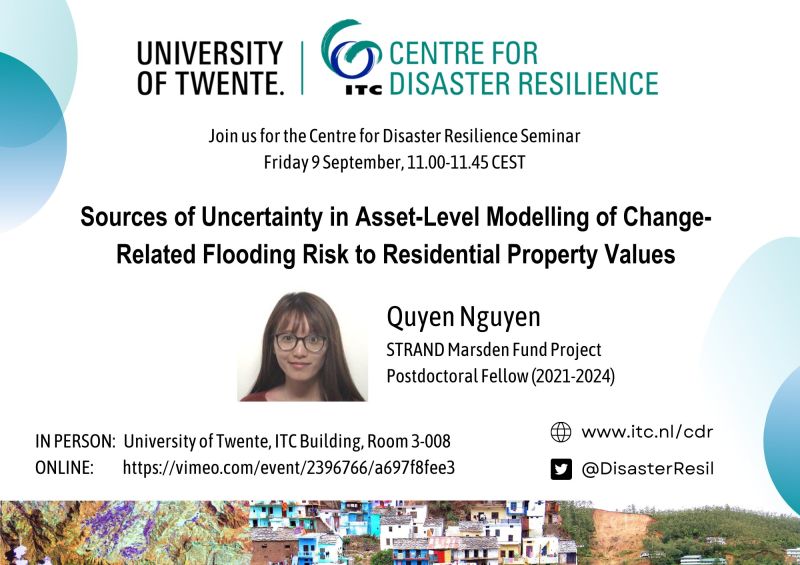Climate change risks to property values
See the original article here
Extreme sea-levels from storms augmented by sea-level rise are potentially a threat to New Zealand’s property values and financial stability, according to a University of Otago expert.
Professor Ivan Diaz-Rainey, of the Department of Accountancy and Finance, joined other prominent speakers at the Assembly of Investment Chairs’ seminar on Tuesday 29 November to discuss this year’s theme of ‘greenwashing, climate disclosures and impact investment’.
He took the opportunity to share the insights he has found 18 months into his three-year long Royal Society-funded Marsden project that partners with GNS Science, Bodeker Scientific, National Institute of Water and Atmospheric Research (NIWA) and the Reserve Bank of New Zealand.
Professor Ivan Diaz-Rainey Speaking at Climate Change, Insurance, Finance and Housing Workshop
Climate and Energy Finance Group (CEFGroup) Director & PI of the STRAND Marsden Project, Professor Ivan Diaz-Rainey, is presenting at the Climate Change, Insurance, Finance and Housing Workshop next Wednesday. Details below:
- Presentation Title: Implications of Climate Change Risk on Residential Property Values and Financial Stability
- Date and Time: Wednesday the 23rd of November, 1:00-1:25 pm New Zealand Time [Note that the workshop runs from 9am to 6pm]
- Registration Link: HERE
- Location: Decima Glenn, Level 3, Sir Owen G Glenn Building, 12 Grafton Rd, Auckland, New Zealand
- Full Program: Climate Change, Insurance, Finance and Housing Workshop
ABOUT THIS EVENT
Join us to hear from industry experts and academics on the implications of climate change on Aotearoa’s housing markets with the introduction of new government policies on managed retreat and adaptation and discuss the future of housing as we face the prospect of financial and insurance retreat. At the conclusion of the event, there will be networking opportunities.
The workshop hosted by Resilience of the Housing Market Research Group, a joint initiative of the University of Auckland – Business School Departments of Property and Commercial Law.
Lunch, morning and afternoon tea will be provided.
AP Antoni Moore presented at New Zealand Geospatial Research Conference and GeoCart conference
AP Antoni Moore, Associate Professor in Geographical Information Science at the School of Surveying, University of Otago and a co-Principal Investigator of the STRAND Marsden project, recently delivered two presentations on the project at the GeoCart’2022 and the 2022 New Zealand Geospatial Research Conference. AP Moore also delivered a keynote speaker entitled “Meta-Geovisualisation” at the GeoCart’2022. Details below:
- Presenting Author: AP Antoni Moore
- Title: Towards a Coastal Asset Risk Index (CARI) for Mapping Risk to
Property from Climate Change-Related Flooding Hazard - Date and Time: 15:30 am – 15:50am August 24th 2022
- Venue: National Library of New Zealand, Wellington
New Zealand Geospatial Research Conference 2022
- Presenting Author: AP Antoni Moore
- Title: Modelling the Effect of Climate Change: Related Flooding
Hazards (CCRFH) on Coastal Residential Property Values - Date and Time: 10:05 am – 10:15 am August 30th 2022
- Venue: Massey University, Wellington

Dr Simon Cox delivered guest lecturers at U3A Dunedin
Dr Simon Cox, Principal Scientist at GNS Science and a team member of the STRAND Marsden project, recently delivered two guest lectures for “A sustainable Dunedin” course in U3A Dunedin with 75 attendees. Details below:
-
- Presenting Author: Dr Simon Cox
- Title:The geology and present hazard issues of South Dunedin.
and
Sea level rise, evolution of hazards and the future of South Dunedin
- Date and Time: 10 am – 12 noon September 9th 2022
- Venue: Leith Bowling Club, 2 Duke Street, North Dunedin

STRAND Marsden Project Seminar Presentations
The Green and Sustainable Finance (GSF) transversal research programme of the Institut Louis Bachelier and the interdisciplinary Energy4Climate Center (E4C, Institut Polytechnique de Paris) hosted a joint seminar 10.00am-11.30am CEST on Monday the 12th of September, at the premises of Institut Louis Bachelier.
Dr Quyen Nguyen, CEFGroup’s STRAND Marsden Postdoctoral Fellow, presented their latest research on the topic of “Asset-Level Modelling of Climate Change-Related Flooding Risk” – parts of the STRAND project. The authors highlight the importance of uncertainty estimates when they relate to high impact public-interest decision-making.
Note that the working paper has also been presented to the ITC Centre for Disaster Resilience at University of Twente this Friday (9th September), 11.00-11.45am CEST. Recording is now publicly available HERE.


Climate change risk: Why are people still buying by the sea?
 Climate change is real and happening right now, but many homeowners in at-risk areas are still not thinking realistically about what it means for their properties, experts say.
Climate change is real and happening right now, but many homeowners in at-risk areas are still not thinking realistically about what it means for their properties, experts say.
The news article is available HERE.
In recent months, there has been a succession of significant floods around the country, and that follows a number of one-in-100-year floods last winter. Continue reading
Atlantis is rising: The suburb that’ll meet sea level, and thrive
 The myth of South Dunedin going underwater in the next 100 years is just that, a myth. One that a scientist, community leaders and councils have tried to bust with limited success. So why are people still convinced? Sinead Gill reports.
The myth of South Dunedin going underwater in the next 100 years is just that, a myth. One that a scientist, community leaders and councils have tried to bust with limited success. So why are people still convinced? Sinead Gill reports.
The news article is available HERE.
When it rains in South Dunedin, it’s not just flooding people are concerned about, but what the flooding represents.
Much of the community, made up of multiple suburbs, was built on swampy terrain, now called “the Flat”. It is infamous for having the most homes 50cm or less above sea level in the whole country – more than Auckland, Wellington and Christchurch combined, according to a 2015 report.
Website Seawise tracks sea level rises and vertical land movements in New Zealand. Dr Simon Cox, a principal scientist at GNS Science, based in Dunedin, said if levels continued to rise at the current rate, parts of South Dunedin would be at or below sea level by 2050. Some 2700 homes would be at or below by 2100.
The climate time limit on New Zealand real estate
![]() As large companies, banks and insurers adapt to the first stages of climate-disclosure legislation, many are see it as an opportunity rather than a hindrance
As large companies, banks and insurers adapt to the first stages of climate-disclosure legislation, many are see it as an opportunity rather than a hindrance
The news article is available HERE.
The ongoing impacts of extreme natural events, the need to plug gaps in climate data and the reaction of the business world to new climate-reporting rules.
These were all topics of discussion in yesterday’s climate change panel hosted by property data company CoreLogic, which saw experts from the overlapping ground between climate science and finance sift through some of the meatier implications of the changing climate for the financial stability of Kiwis, businesses and the broader economy. Continue reading
Answers to climate risk and housing getting closer
 As climate risks increase, a long-term project has been launched to look for answers into the link between house prices and climate change.
As climate risks increase, a long-term project has been launched to look for answers into the link between house prices and climate change.
The news article is available HERE.
As a lot of capital is raised through the country’s banks, climate change it is probably the biggest risk because about 80% of wealth is tied to people’s homes.
Most Kiwis live close to the coast and 60% of bank assets are in domestic real estate.
Taking a materiality perspective it seems to be the biggest risk the country faces and while New Zealand does not have uninsurable pockets of property near coastal areas, it is not far away.
The risk of flooding has long been a fact of life in many coastal communities, but increasingly volatile conditions due to the changing climate may mean more serious, and more frequent, floods.
CoreLogic Climate Change Panel: Addressing climate change, financial stability and property in New Zealand
On Thursday 7th of July, several climate experts, including CEFGroup Director Ivan Diaz-Rainey, discussed the increasing impact of climate change on New Zealand property, and the implications for the financial stability of Kiwis, businesses and our broader economy via CoreLogic New Zealand‘s Climate Change Panel.
Details below:
Addressing climate
change, financial stability and property in New Zealand
Thursday, 7th July 2022
12.30pm – 1.30pm
(including 15 mins live Q&A)


